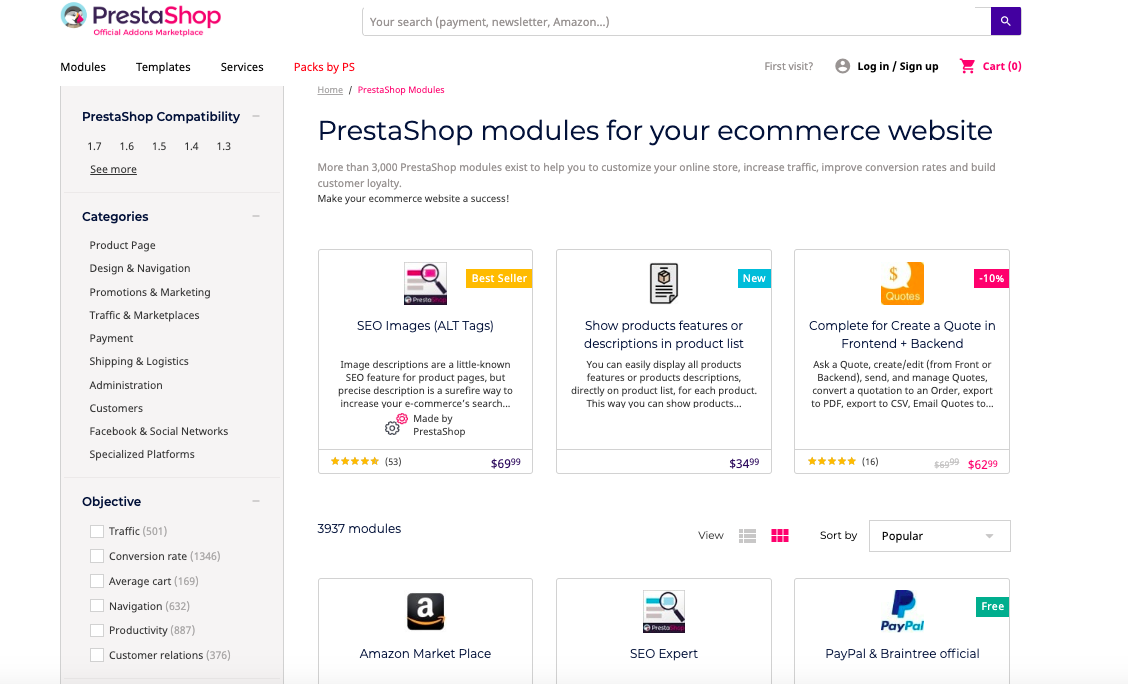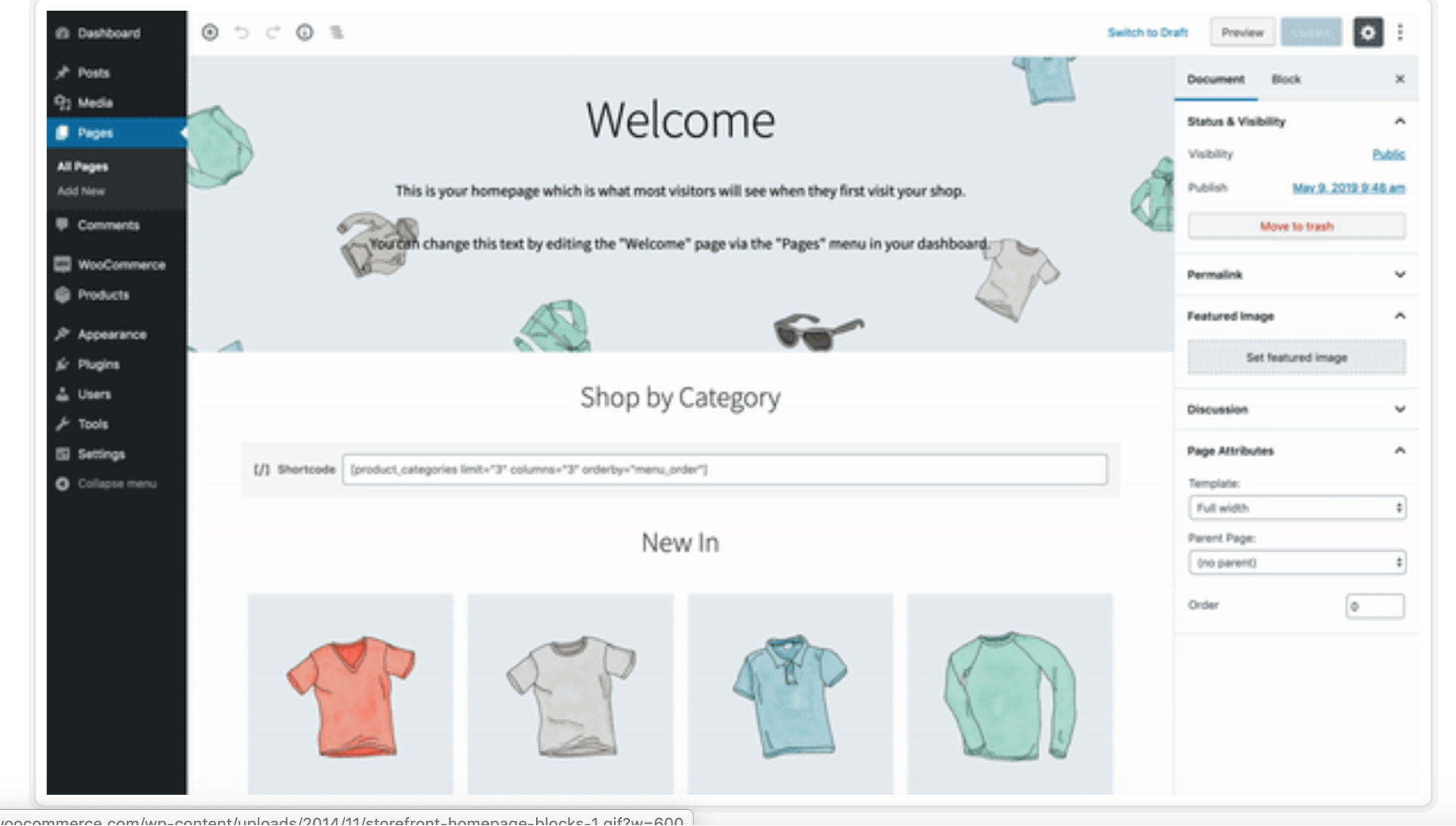Best Shopify Alternatives for Small Businesses
- BigCommerce: Best for businesses that want to use their own payment processor with no added transaction fees, that have a large product inventory, or need unlimited staff accounts.
- 3dcart: Best for businesses that need more flexibility when it comes to payment processing and are comfortable editing with HTML/CSS code.
- Volusion: Best for smaller ecommerce businesses that are looking for low transaction fees.
- Square Online Store: Best for businesses that already use Square point of sale and want to expand their sales channels, or those looking for a simple, free ecommerce solution.
- PrestaShop: Best for businesses looking to try an open-source platform with personalized customization, international capabilities, and impressive out-of-the-box features.
- Magento: Best for large or quickly growing ecommerce businesses that need greater customization options and sell internationally.
- WooCommerce: Best for business websites built on WordPress.
- Weebly: Best for small businesses that want to dip their toes into ecommerce without committing to a more costly platform.
- Wix: Best for businesses that have just begun selling online, but are looking for high-quality design and customization options.
- Squarespace: Best for small businesses that, first and foremost, need a beautifully designed website to showcase visually focused products or services.
If you’re looking to start an ecommerce business, you’ve probably heard of Shopify. With 800,000 active stores around the world, Shopify has become a household name in the ecommerce industry. But just because Shopify is a popular platform for building and launching an online store doesn’t mean it’s the only one out there. In fact, there are hundreds of different types of ecommerce solutions, each with their own specific feature set, pricing, and unique appeal. Therefore, whether you currently use Shopify or are exploring all of your options before starting your online store, it’s worth looking into Shopify alternatives.
With the variety of Shopify alternatives that are available for small business owners, you might be unsure where to start your search. This guide is here to help. Based on our research and knowledge of various ecommerce platforms, we’ve compiled this list of the top 10 Shopify alternatives.
Top 10 Shopify Alternatives
We’ve included a few different types of Shopify alternatives, from all-in-one hosted solutions to open-source software and website builders. All of the 10 Shopify alternatives on our list are going to provide you with the basic functionality of any ecommerce software—meaning that they will give you the ability to start and manage your online store. However, each of these alternatives will have unique specifications and built-in capabilities, as well as pricing.
1. BigCommerce
Best for: Businesses that want to use their own payment processor with no added transaction fees, that have a large product inventory, or need unlimited staff accounts.
BigCommerce is perhaps one of Shopify’s greatest and most direct competitors. Like Shopify, BigCommerce offers you the ability to create and customize your store, sell on a variety of channels, and control the whole of your ecommerce operations from one place.
BigCommerce Pros:
- No transaction fees: BigCommerce does not offer in-house payment processing; however, they give you the ability to integrate with over 65 top payment gateways and do not charge any transaction fees on top of those from the processor directly. Additionally, if you choose to work with Braintree and meet the qualifications, BigCommerce offers discounted processing rates that can go as low as 2.2% + $0.30 per transaction with their Pro plan.
- Unlimited staff accounts: Whereas Shopify only includes 15 staff accounts even with the Advanced Shopify plan, all of the BigCommerce plans offer unlimited staff accounts.
- Gift cards and reporting: Gift cards and professional reports are two features that Shopify only starts offering with their $79 plan—BigCommerce, on the other hand, includes these two features in all of their plans.
- Single-page checkout: An important functionality to prevent cart abandonment, BigCommerce offers single-page checkout for all of their plans. Shopify requires an add-on for this capability.
- User-friendly: Although it’s hard to make a cut-and-dried comparison when it comes to how user-friendly a platform is, ease of use is something that’s frequently mentioned in BigCommerce reviews. This may not be a huge difference in terms of BigCommerce vs. Shopify, but it’s definitely a point to consider, especially if you’re new to ecommerce.

BigCommerce Cons:
- Abandoned cart saver: Shopify offers abandoned cart recovery tools with all of their plans, whereas BigCommerce only starts offering them with their Plus plan.
- Online sales per year: Each of the BigCommerce plans has a limit for the number of online sales you can have per year. Their standard plan, for example, has a yearly limit of up to $50,000. Shopify does not impose sales limits on any of their plans.
- Integration options: Although BigCommerce also has a robust app store, they do not have nearly as many options as Shopify.
BigCommerce Pricing:
Taking all of this into consideration, let’s discuss how the cost of BigCommerce compares to Shopify. Like Shopify, BigCommerce offers three standard plans. In fact, these plans are priced very similarly to Shopify’s—with the Standard plan priced at $29.95, the Plus plan at $79.95, and the Pro plan at $249.95. As we mentioned earlier, the cost of payment processing depends on the payment gateway you choose; however, regardless of your provider, you will not face any additional transaction fees from BigCommerce themselves.
All of this being said, BigCommerce is a worthy alternative for any business owner considering Shopify. Since these two platforms are quite similar, determining if either is better for your business will depend on your individual needs. However, BigCommerce might be a more cost-effective solution if you want to be able to choose your payment processor, as well as if features like gift cards, reporting, and single-page checkout are of particular value to your business.
2. 3dcart
Best for: Businesses that need more flexibility when it comes to payment processing and are comfortable editing with HTML/CSS code.
Like BigCommerce, 3dcart’s ecommerce functionality, plan options, and pricing are incredibly similar to Shopify’s. However, there are a few significant ways in which 3dcart stands out as one of our top Shopify alternatives.
3dcart Pros:
- Built-in features: According to 3dcart’s website, the platform includes over 200 built-in features—giving you an impressive amount of functionality for your ecommerce store.[1] Most notably, all of the 3dcart plans offer single-page checkout, reports and dashboards, domain registration, product and customer reviews, gift cards, coupons, discounts, saved carts, and more.
- Payment processing: 3dcart allows you to connect with over 100 different payment processors, without charging additional transaction or integration fees. Like BigCommerce, 3dcart also works with specific third-party providers to offer discounted processing rates for qualified merchants. With these preferred rates, online processing fees start at 2.9% and can go as low as 2.5%.
- Startup store: When you compare 3dcart vs. Shopify, you’ll notice that Shopify’s first full-service plan, Basic Shopify starts at $29. 3dcart, on the other hand, has a Startup Store plan that starts at $19 per month. If you’re looking for the most affordable solution, this Startup plan is not only $10 cheaper than Shopify’s first offering, but also offers an immense amount of features, including advanced tools like social wish lists, gift wrapping, upsell and cross-sell, and unlimited product variants.
- Store building: Whereas Shopify gives you the option to use their drag-and-drop store builder or customize your site using code, 3dcart requires you to edit their themes with HTML/CSS code. Depending on your web experience level, this could be a benefit or drawback of 3dcart—however, if you are able to edit using these languages, you’ll be accessing a level of customization that you don’t necessarily receive with a “what you see is what you get” editor.

Ecommerce website built with 3dcart.
3dcart Cons:
- HTML/CSS editing: Once again, the fact that 3dcart requires you to edit their themes with HTML or CSS means it could alienate ecommerce and web beginners who have no technical knowledge and don’t want to work with a developer.
- Theme designs: Although 3dcart offers a variety of free and paid themes, editing aside, the themes themselves don’t seem as modern and professional-looking as competitors like Shopify.
- Usability: It wouldn’t be fair to say that 3dcart is difficult to use; however, it certainly isn’t as intuitive and approachable as Shopify. In fact, customer reviews often report that 3dcart could have a better and less complex interface.
- Add-ons and advanced features: 3dcart has one of the most robust feature sets of any of the platforms on our list of Shopify alternatives; however, there are some notable capabilities—abandoned cart, loyalty programs, email newsletters—that require you to opt for, at a minimum, the $79 plan. Additionally, 3dcart does not offer nearly as many integration options as Shopify—plus, if you need any of the add-ons they offer, the cost of your platform could quickly rise.
- Customer support and reviews: Whereas Shopify has generally positive customer reviews, the reviews for 3dcart are pretty average, with divisive opinions about their customer support service. Although this may not be the most concrete drawback of 3dcart’s platform, it can be problematic if you think you’ll want or need to utilize the support your solution offers.
3dcart Pricing:
As we briefly mentioned earlier, 3dcart’s pricing is extremely similar to Shopify’s—in fact, it only differs very slightly. To explain, 3dcart offers the Startup Store for $19, whereas Shopify’s initial plan offering starts at $29. However, the next two levels of 3dcart plans, Basic and Plus, cost $29 and $79 respectively, the same as the Basic and Shopify plans. The final core plan that 3dcart offers costs $229 per month, making it $70 cheaper than the Advanced Shopify plan.
Additionally, 3dcart offers a 10% discount on all of their plans if you pay for a yearly subscription upfront. Moreover, as previously discussed, just like BigCommerce, online credit card processing will depend on your provider, but 3dcart will not charge additional transaction fees regardless of the processor you choose.
Therefore, 3dcart might be the Shopify alternative for you if you want more flexibility when it comes to payment processing. Furthermore, if you don’t have any issues with editing your template using HTML/CSS, 3dcart is going to provide you with immense functionality, even at their most basic plan level. With the Startup Store plan priced at $19, this is going to be one of the most affordable monthly costs you’ll find, with the most features.
3. Volusion
Best for: Smaller ecommerce businesses that are looking for low transaction fees.
Volusion is another top Shopify alternative, and for good reason. Like the other two platforms we’ve discussed thus far, Volusion offers business owners similar functionality at a similar cost to that of Shopify. Interestingly enough, however, Volusion is among the first of this kind of ecommerce software, having started in 1999.[2]
Volusion Pros:
- Features and expertise: On the whole, Volusion offers a solid feature set, including a rich content editor, homepage slideshow, secure checkout, shipping options, recurring payments, customer relationship management (CRM), and more. Plus, Volusion has the benefit of two decades of experience, enabling them to learn from competitors and add new features as the industry develops.
- Payment processing: Volusion offers payment processing from Stripe, PayPal, and their own Volusion Payments with all of their different plans. In addition, unlike Shopify, Volusion will not charge you an additional transaction fee for using a third-party payment provider. Moreover, if you do decide to use Volusion Payments, you’ll see very low transaction fees, only 2.15% + $0.30.
- Usability and reviews: Like many of the Shopify alternatives on our list, Volusion is also known for its ease of use and positive reviews. With their drag-and-drop builder and rich content editor, Volusion does not have the same barrier to entry like 3dcart, but rather, is approachable for all kinds of business owners looking for a customizable and user-friendly solution.

Volusion website themes.
Volusion Cons:
- Price: Payment processing aside, Volusion’s three main plans cost exactly the same as Shopify’s plans, unless you prepay for three months of service. However, considering that their pricing change in September 2018 raised their prices, this is actually a negative for Volusion, as they used to be more affordable.[3]
- Scalability: Although Volusion’s plan offerings are very similar to Shopify, on the whole, the platform offers fewer features, add-ons, and theme options. Therefore—and especially if you’re looking to grow your ecommerce business quickly—there is less incentive to choose Volusion as opposed to Shopify.
Volusion Pricing:
Volusion’s three plan offerings, at $29 per month, $79 per month, and $299 per month, are priced exactly the same as Shopify’s core plans. However, unlike Shopify, Volusion has yearly online sales limits for each of these plans—$50,000, $100,000, and $500,000 respectively.
Keeping all of this in mind, business owners who are particularly concerned with accepting payments online may want to consider Volusion as an alternative to Shopify. Although there are not many consequential differences between the two platforms, the most significant is certainly the lower processing rate for using Volusion Payments.
4. Square Online Store
Best for: Businesses that already use Square point of sale and want to expand their sales channels, or those looking for a simple, free ecommerce solution.
If you’re looking for an all-inclusive ecommerce solution, but aren’t quite sure you need everything Shopify has to offer, you might consider Square Online Store. Although perhaps more well-known for their point of sale systems, Square’s recent update to their ecommerce offering puts their platform on our list of top Shopify alternatives.
Square Online Store Pros:
- Free plan: This is the first platform on our list of Shopify alternatives that offers an ecommerce plan with no monthly cost. The Square Online Store essentially allows you to create a free ecommerce store and includes features such as shopping cart functionality, the ability to accept payments through Square, unlimited products, SEO, inventory management, and more—and you only pay the transaction rate of 2.9% + $0.30.
- Simplicity: If you’re just starting an ecommerce business and aren’t sure if you need some of the advanced features of platforms like Shopify and BigCommerce, you’ll appreciate the simplicity of Square Online Store. This platform allows you to create and customize your online store, list your products, and fulfill orders without the hassle of sorting through a variety of advanced capabilities that could easily overwhelm an ecommerce beginner.
- Square integration: As you might imagine, since this platform is part of the wider Square offerings, a large part of the appeal is its direct integration with Square POS. If you utilize Square point of sale for your restaurant, retail, or service business, you can easily connect your POS system to your Square Online Store to grow your sales channels. Although other platforms that we’ve discussed offer point of sale connections, using Square for in-person and online transactions means you can manage all of your business operations in one place.

Square Online Store Cons:
- Square payment processing: A big comparison point we’ve discussed with all of our Shopify alternatives thus far has been options for payment processing. With Square Online Store, however, you have very limited payment processing options. As you might imagine, all of the Square Online Store plans, first and foremost, allow you to accept payments using Square. However, other than this option, you only have the choice to accept payments through PayPal at the two higher plan levels.
- Limitations and scalability: If you’re looking for a quick and easy way to start your online store, there’s no doubt that Square Online Store might be worth considering. However, if you’re looking to scale your ecommerce operation greatly and would benefit from having access to advanced features like email newsletters, CRM tools, etc. you’re not going to find these capabilities with Square Online Store.
- Features included in different plans: Similarly, although Square Online Store has an impressive free plan, some essential ecommerce tools that many other platforms offer are only included in their two higher-level plans. For example, third-party integrations, shipping services, and ecommerce statistics require, at a minimum, the third Square Online Store plan (Performance). Although this plan only costs $29 when billed monthly, there are many other platforms, like Shopify, that can give you much greater functionality for the same cost.
Square Online Store Pricing:
Nevertheless, with the four Square Online Store plans starting at $0 per month and ending at $79 per month ($72 if you choose to bill annually), they’re some of the most affordable that we’ve discussed thus far.
Therefore, Square Online Store is a worthy Shopify alternative for businesses that already use Square point of sale and want to expand their sales channels, or for businesses who simply want to try starting an ecommerce website for the first time. Using Square Online Store could certainly be an approachable and affordable way—especially compared to some of the other platforms on this list—to test out an ecommerce business without putting significant, time, money, or effort on the line.
5. PrestaShop
Best for: Businesses looking to try an open-source platform with personalized customization, international capabilities, and impressive out-of-the-box features.
Although as an open-source platform, PrestaShop is inherently different from Shopify, there are a number of reasons that nevertheless make it a Shopify alternative worth considering for small business owners.
PrestaShop Pros:
- Built-in features: Even though PrestaShop gives you the ability to edit their code in any way you see fit to customize the software for your specific business, from the get-go, this platform has an impressive amount of features built-in. PrestaShop includes capabilities like inventory tracking, internal search engine, payment processing integration, one-page checkout, tax configuration, abandoned cart emails, customer database creation, and more.
- Customization: As we mentioned, one of the benefits of an open-source platform is its unique customization opportunities. Once you’ve downloaded PrestaShop, you can edit the code to create and customize your online store and its functionality as you need. Plus, you can utilize any of the already created modules in the PrestaShop marketplace. The marketplace contains 10,000 modules, themes, and services—both free and paid—that can be installed with one click. Moreover, although PrestaShop customization does require technical knowledge, customers find it to be one of the more user-friendly open-source solutions.
- International reach: As a European-based business, PrestaShop offers specific features for those looking to sell internationally. With PrestaShop, you can present your store in different languages and currencies, as well as adapt for international taxes and shipping.
- Support: Although customer support is often a pretty standard feature of hosted ecommerce platforms, it is typically not offered for open-source solutions, as the software is free to download. PrestaShop, however, offers a variety of different support plans that you can purchase for specific assistance with your online store—including help getting started, technical help, and even help for growing your business.

PrestaShop modules.
PrestaShop Cons:
- Development requirements: As with all of the open-source platforms on this list, PrestaShop requires technical knowledge or developer resources to set up and customize your online store. Comparing PrestaShop vs. Shopify, you can quickly get your store up and running with Shopify, whereas PrestaShop is going to take much more time and hands-on maintenance. Additionally, if you need to outsource these tasks to a developer, you’ll more than likely need to continue to work with that resource to manage updates, changes, and security to your ecommerce site. Since working with a developer can be time-consuming and expensive if you don’t have technical knowledge yourself, this is certainly something to consider with a solution like PrestaShop.
- Expensive add-ons: Although it is useful that PrestaShop has a marketplace for integrations you can use to extend your functionality, some of the modules are expensive and the cost can quickly add up, especially if you need a developer to install and manage them. As an example, the Amazon marketplace add-on costs $229.99, whereas many platforms, like Shopify, give you the ability to connect with Amazon for free.
All of this being said, however, if you’re looking to try out an open-source ecommerce solution, and you’re aware of the possible costs of hosting, development, security, maintenance, etc. PrestaShop can be a great Shopify alternative—especially if you want personalized customization, international capabilities, and impressive out-of-the-box features.
6. Magento
Best for: Large or quickly growing ecommerce businesses that need greater customization options and sell internationally.
One of the most well-known open-source ecommerce solutions, Magento is used by big brands around the world and, in fact, has expanded their offerings to a fully hosted solution, making them even more competitive as a Shopify alternative. However, since Magento is still considered by most as open-source software—and this aspect makes their platform particularly unique—we’ll be discussing it as such.
Magento Open Source Pros:
- Features: Similar to PrestaShop, Magento provides significant built-in functionality, especially for an open-source solution. Magento offers integrated checkout, payments, and shipping—including international payment and shipping options. Along these lines, Magento can also accommodate transactions and currencies across countries. Additionally, Magento includes instant purchase, site search, and the ability to integrate with any of the hundreds of extensions in their marketplace.
- Customization: Once again, one of the largest points of appeal to a platform like Magento is the customization capabilities. As you’ll have access to Magento’s source code, you (or a developer) will be able to edit, modify, and add to any part of the software as necessary. If you want your ecommerce business to stand out among the competition, Magento will certainly allow you to do so.
- Scalability: One of the unique aspects of Magento is the platform’s scalability. Magento can accommodate small businesses but also those that are larger and growing quickly. Magento offers enterprise services, as well as solutions for B2B, global expansion, and omnichannel commerce. If you’re ready to take your ecommerce business to the next level, Magento will be able to support you.

Example of a website built with Magento.
Magento Cons:
- Development: For a software platform as expansive as Magento, you’re going to need development resources. Whereas PrestaShop is known for their approachability—despite being open-source—Magento is not nearly as user-friendly. Therefore, if you want to be able to run your ecommerce operations on your own or get up and running as quickly and easily as possible, (especially when comparing Magento vs. Shopify), Magento is not going to be your best option.
- Cost: Although Magento Open Source is free to download, the costs that are required to set up and maintain your online store using this platform can quickly add up. With the development resources that are needed, in this case, many customers feel that the cost is only appropriate for larger or fast-growing businesses.
If you’re interested in a Shopify alternative with greater customization options and immense scalability, Magento might be an option to consider. However, you’ll still want to keep in mind the cost and management required for a platform like this—especially for smaller businesses.
7. WooCommerce
Best for: Business websites built on WordPress.
Despite the worldwide popularity of Shopify, 30% of all online stores use WooCommerce for their ecommerce businesses.[4] Unlike PrestaShop and Magento, WooCommerce is a different type of open-source solution. Although WooCommerce does give you the ability to edit the source code to customize your site, it is first and foremost a WordPress plug-in—meaning you have to already have a WordPress website to use it.
WooCommerce Pros:
- Features and customization: Even as a WordPress plug-in, WooCommerce can give you impressive ecommerce functionality and customization abilities. WooCommerce offers built-in payment processing with leading providers, unlimited selling options—including product variations, images, and page customization—as well as options for shipping, taxes, customer management, and more. Once again, although WooCommerce includes significant built-in functionality, as an open-source plug-in, everything is customizable and can be modified specifically for your business needs.
- Usability: Since you already need to have a WordPress business website set up to use WooCommerce, installing and utilizing this plug-in is relatively easy—especially compared to the other open-source solutions we’ve discussed. Although WooCommerce is probably most effectively utilized with some specialized development, it can also be used more or less “as is.”
- Price: Setting aside the cost to host and secure your WordPress site, WooCommerce, like Square Online Store, is probably the closest to a free Shopify alternative. WooCommerce is free to download, and if you’re not paying a developer to help with customization, it will be very cost-effective to use for your ecommerce operations. Furthermore, WooCommerce does not charge any additional fees for payment processing, other than those that come directly from your provider.

WooCommerce Storefront editor.
WooCommerce Cons:
- WordPress: Perhaps the biggest possible drawback of WooCommerce is that it’s specifically a WordPress plug-in. You cannot use WooCommerce if your website is hosted on another platform and likewise, if you want to use WooCommerce to start your online store, you’ll have to set up a WordPress website first.
- Limitations: Similar to the limitations WooCommerce has as a WordPress plug-in, this solution does not offer the same overall scalability as a hosted, all-in-one platform. Comparing WooCommerce vs. Shopify, Shopify offers many operational functions—hosting, storage, backups, security, updates—that WooCommerce simply does not include. If you’re looking to grow your business, automate your operations, and manage everything in one-place, WooCommerce isn’t going to be able to meet those needs.
Taking all of this into consideration, WooCommerce could be a great Shopify alternative for business owners who already have a WordPress site and are looking to get started in ecommerce. As a free plug-in with many included features, WooCommerce can be a quick and easy way for you to turn your website into an online store and begin your selling experience. Plus, if you have some technical skill or a development resource, WooCommerce can be further customized to make your ecommerce site particularly unique.
8. Weebly
Best for: Small businesses that want to dip their toes into ecommerce without committing to a more costly platform.
As a website builder whose ecommerce function is now powered by Square, Weebly is perhaps one of the easiest platforms to use to set up your website and online store. Plus, Weebly offers a website plan completely free—and their ecommerce plans are extremely affordable.
Weebly Pros:
- Simplicity: Weebly was created to make web building approachable for everyone. They offer a variety of modern and professionally designed themes that can be modified using their drag-and-drop editor. Additionally, Weebly provides SSL security, web hosting, and the overall essential tools that you need to manage your site or online store. With the intuitive nature of the Weebly platform, you’ll have the opportunity to set up your store quickly and easily.
- Plans: As we mentioned earlier, if you’re not yet ready to try ecommerce, you can utilize Weebly’s website basic use plan, completely free. However, if you’re looking to start selling online, you can opt for one of Weebly’s paid plans, which for online stores, range from $12 to $38 per month.[5] With these plans, Weebly provides ecommerce functionality—from a shopping cart to product options to shipping tools— at one of the most affordable monthly costs on the market.
- Cost: Going off our last point, Weebly’s cost is extremely appealing, especially for small business owners. Not only does Weebly offer a variety of plans at low monthly costs, but they also offer credit card processing from Square as well as other providers, without charging additional transaction fees. Plus, all of the themes Weebly lists on their website are free.

Weebly theme options.
Weebly Cons:
- Limitations: Although Weebly might be perfect for a first-time business website, it certainly is limited in what it can offer—especially if you’re growing your ecommerce operation quickly. Weebly’s low-cost online store plans will certainly be able to accommodate a small-scale online store, but it’s lacking the advanced tools for a fully fledged ecommerce business.
Therefore, Weebly is a great option for small businesses that want to set up their website or online store quickly and easily, without needing to invest significant time and resources. If you want to test your ecommerce idea without committing to a more costly, ecommerce-focused platform like Shopify, Weebly is certainly worth considering.
9. Wix
Best for: Businesses that have just begun selling online, but are looking for high-quality design and customization options.
Like Weebly, Wix is a website builder with business-specific offerings, including ecommerce functionality. Although Wix and Weebly are pretty similar, Wix offers more options and advanced website features.
Wix Pros:
- Design and customization: With Wix, you not only can choose from different templates to build your website or online store, but you also can choose your building method as well. You can utilize the Wix Web Editor, their drag-and-drop builder, the Wix ADI, which designs a unique website for you based on your answers to a few simple questions, or you can use Corvid by Wix, an open development platform. With these three ways to create your site, among the various themes, features, and add-ons, Wix provides you with high-level functionality and customization.
- Business-specific features: In addition to their general web-building features, Wix offers free and premium business-specific features. For example, Wix offer solutions designed for particular business types, including photography, video, service-based businesses, and of course, online stores. Plus, if you opt for one of the premium business paid plans, Wix will include a custom domain, Google Analytics integration, unlimited bandwidth, additional web tools, and more.
- Price: One of the most notable benefits of Wix is that, like Weebly, you can choose to use it completely free. However, if you want to start selling using your Wix site, you’ll have to choose one of the business premium plans. These plans start at $23 and include the ability to accept payments without additional transaction fees.

Wix theme options.
Wix Cons:
- Growth opportunity: Although Wix offers three different paid business plans, as well as an enterprise solution, these plans are simply not as well-equipped for the growth and automation of an online store as a platform like Shopify is. A Wix Store will include a store manager, product pages, coupons and discounts, and tax and shipping tools—however, for the $27 Wix Business Unlimited plan, you’re not gaining any particularly useful ecommerce tools. Comparing Wix vs. Shopify, as Shopify’s plans progress (since it is a software designed specifically for ecommerce), you’ll receive more and more features that will facilitate and optimize your ecommerce business.
- Overwhelming options: It’s certainly a benefit that Wix gives you many options to choose from and can cater to many types of businesses. However, with hundreds of templates and features, Wix can easily be overwhelming, especially if you’re looking for simplicity or, on the other hand, more catered functionality.
All things considered, Wix is a robust web-building platform that is a good option for businesses that are just starting out selling online—especially if they’re looking for high-quality design and customization options. Although not as simple as a platform like Weebly, Wix is a feature-rich, affordable solution for smaller businesses that don’t need all of the ecommerce-specific capabilities of Shopify.
10. Squarespace
Best for: Small businesses that, first and foremost, need a beautifully designed website to showcase visually focused products or services.
The final platform on our list of Shopify alternatives, Squarespace, is yet another web-builder platform that offers plans for ecommerce businesses. Unlike Weebly and Wix, however, all of Squarespace’s plans, for both websites and online stores, are paid plans.
Squarespace Pros:
- Template design: Squarespace is well-known for the design of their templates—including those for simple websites, online stores, and business-specific purposes like events, restaurants, and professional services. All of the Squarespace templates can be easily edited (even on mobile) using their “what you see is what you get” editor.
- Features: Like Wix, Squarespace offers significant functionality for both websites and online stores. In fact, the feature index on Squarespace’s website is lengthy, but notably includes the following for their online stores: an integrated commenting system, email campaigns, unlimited products, single-page and express checkout, product merchandising, abandoned checkout recovery, third-party integrations, and more.

Example of Squarespace store theme.
Squarespace Cons:
- Price: Although Squarespace’s pricing plans start at $16 per month, you’ll have to opt for the $26-per-month plan to receive ecommerce functionality. Additionally, this plan will come with a 3% transaction fee on top of the fees from your payment processor. To avoid that transaction fee, you’ll have to choose the $30 or $46 monthly plan—in fact, several important ecommerce features, like gift cards and abandoned cart recovery, are only available with the $46 plan. Therefore, comparing Shopify vs. Squarespace, Shopify will probably end up being more cost-effective if you’re looking to operate a solid ecommerce store.
- Usability: Although it may be easy to use Squarespace to build a website, it seems that Squarespace suffers from a similar downside to Wix, in that it includes an overwhelming amount of options that may not be useful—depending on your particular business and needs. To use this platform for selling online, however, you may find that the vast amount of website features are distracting and not helpful, especially considering you have to pay for the highest-level plan for many of the ecommerce functions.
Therefore, like Wix and Weebly, Squarespace is probably one of the Shopify alternatives best-suited for smaller businesses that are just getting started with their digital presence and are looking to build a business website. Although you can use Squarespace as a solution for beginning an ecommerce operation, the features of the platform will most greatly benefit you for website-specific purposes.
Why You Might Consider Shopify Alternatives
Now that we’ve run through 10 of the top Shopify alternatives, you may need a refresher on the Shopify platform itself. Here, we’ll discuss the main pros and cons of selling on Shopify, as well as costs, so you can get a better sense of how those other solutions stack up against Shopify.
Pros of Shopify
Once again, every business will have different qualifications when evaluating which ecommerce solution is best for them. However, on the whole, these are some of the pros of using Shopify:
- Usability: Shopify is considered one of the most user-friendly ecommerce platforms on the market. Whether you’ve never created an ecommerce website before or have prior technical knowledge, Shopify is approachable, intuitive, and useful. Most notably, Shopify allows you to choose from their library of professional themes and customize your online store to meet your business needs. With a drag-and-drop store builder, you can create and launch your ecommerce website without needing to write or edit any code.
- Customization and features: Another significant benefit of Shopify is the amount of features that are included in the platform and the opportunity you have to customize your online store, making it specific to your individual business. In addition to your website customization abilities, Shopify also gives you the ability to personalize the features of your online shopping cart, order flow, product listings, and more. At the end of the day, Shopify offers a robust feature set and certainly can be considered an all-in-one ecommerce solution.
- Integrations: If the Shopify platform doesn’t include a tool or feature that you need for your online store, more than likely you’ll be able to find an appropriate integration in the Shopify App Store. Between free and paid add-ons, Shopify offers over 1,200 integrations in their app store, making it one of the most expansive app stores out there. Shopify integration options include social media plug-ins, dropshipping tools, and everything in between.
- Customer support: An important qualification especially if you’re starting an ecommerce website for the first time is a platform’s customer support. Shopify not only offers 24/7 support, but offers this access via email, live chat, or phone. Additionally, Shopify provides self-service support tools on their website, like a help center, discussion forums, and their ecommerce university. Moreover, 24/7 access to Shopify’s support team is available with all of their plans, not just the higher-level plans.
Cons of Shopify
As you can see, there are many reasons why you might choose Shopify as your ecommerce solution. However, there are also equally valid reasons why you might be searching for Shopify alternatives. Here are some of the main points that lead business owners to look for a different software solution:
- Payment processing: Perhaps one of the most common criticisms that you’ll see of Shopify is in regard to their payment processing. If you want to use a third-party provider other than Shopify’s own Shopify Payments, you’ll have to pay an additional transaction fee. This becomes particularly problematic for international sellers, as Shopify Payments is only available in 13 countries.
- Advanced features and reliance on add-ons: Although Shopify offers a robust feature set, it can also be said that some significant capabilities are only available with the higher-level plans. For example, for professional reports and gift card acceptance, you’ll have to choose at least the $79-per-month plan—which can certainly be a hefty cost for some business owners. Similarly, even though the amount of available add-ons can be a benefit of Shopify, it can be a drawback as well. It might be easier to find a platform that includes more functionality without needing add-ons, especially considering that paid integrations can quickly add up.
- Template language: For business owners who are looking for more in-depth customization, particularly using code, you may find problems with Shopify’s templating language. Shopify’s templates are created with a custom programming language called Liquid, which is not the most straightforward and easy to use, even for developers. Many other ecommerce platforms, on the other hand, use more common languages, like PHP or CSS, that are well-known and more approachable from developer to developer.
Shopify Pricing
In terms of cost, Shopify has three main plan offerings, as well as Lite and Enterprise solutions. The three main plans start at $29 per month and continue at $79 per month and $299 per month. If you use Shopify Payments for payment processing, your transaction rate will start at 2.9% + $0.30 for the Basic Shopify plan and can go as low as 2.4% + $0.30 with the Advanced Shopify plan. However, if you use a third-party payment processor, you’ll pay an extra transaction fee of 1% to 2% on top of the credit card processing fees charged by your provider.
The Bottom Line
At the end of the day, there are hundreds of Shopify alternatives on the market—in addition to the ones on our top 10 list. However, if you’re interested in switching from Shopify to another platform, or if you’re simply considering other options as you start your ecommerce business, any of these 10 offerings may be well-suited for your needs.
If you’re looking for a solution that is most closely comparable to Shopify, you might consider one of the all-in-one hosted solutions—like BigCommerce or 3dcart. On the other hand, if you have development resources and want truly unique customization for your online store, one of the open-source platforms, like PrestaShop, may be a good option. Finally, if you’re a smaller business looking first and foremost for a website, with the possibility of selling online in the future, a web-builder solution like Weebly might be best for you.
Ultimately, though, you’re the only one who can decide which ecommerce solution is right for your business. If you’re still unsure if any of these Shopify alternatives will meet your needs, we’d recommend signing up for free trials or free plans so that you can test out the software for yourself before making a final decision.

Randa Kriss
Randa Kriss is a senior staff writer at Fundera.
At Fundera, Randa specializes in reviewing small business products, software, and services. Randa has written hundreds of reviews across a wide swath of business topics including ecommerce, merchant services, accounting, credit cards, bank accounts, loan products, and payroll and human resources solutions.

